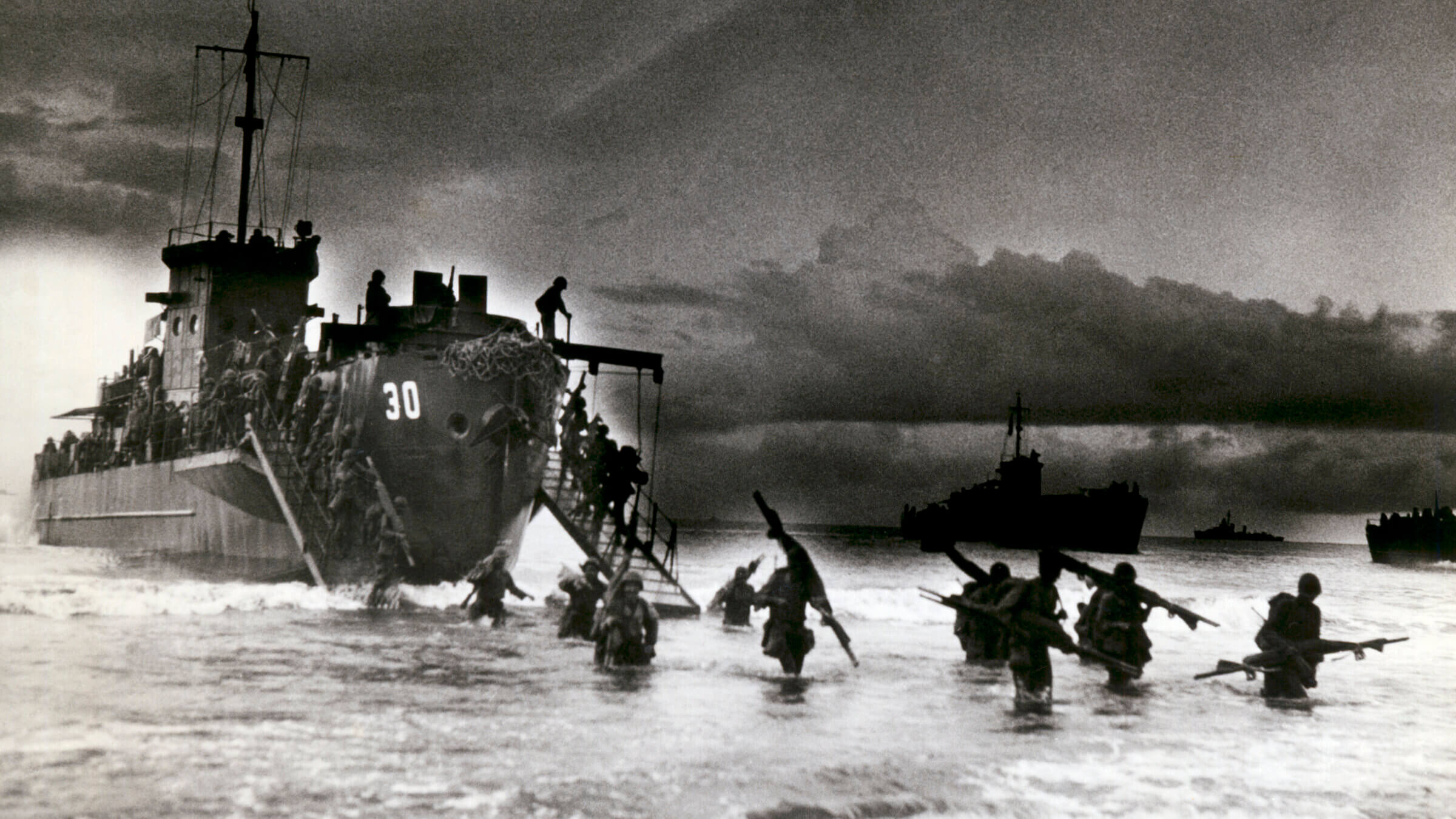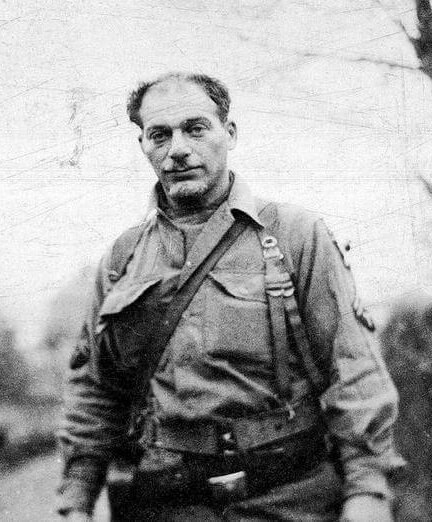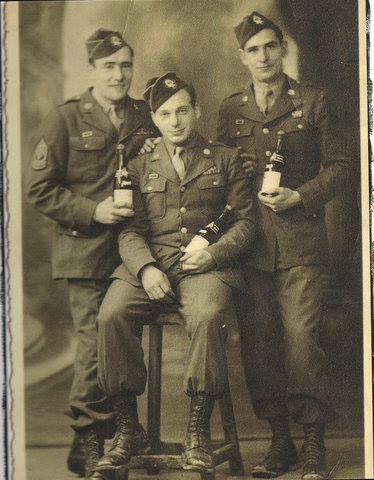My dad stormed Normandy on D-Day — and relived the fight against Nazis every night
My father parachuted into France and fought during World War II on a personal mission to defeat Hitler

View of Allied troops from a transport vessel, among them medics with stretchers over their shoulders, as they wade ashore during the invasion of Normandy, France, in June 1944. Photo by Underwood Archives/Getty Images
My father was a paratrooper in World War II, part of the 101st Airborne’s famed parachute division. He jumped from the fifth plane out of England a few minutes after midnight on D-Day, June 6, 1944.
He was the son of Russian Jewish immigrants and an eighth grade dropout who worked in the Garment District, and his experiences as a soldier were the most important things that ever happened to him.

He relived those experiences every night at the dinner table. We didn’t know the term PTSD when I was a kid, but looking back, it seems to me that he lived every day like it was his last. I guess that was his way of coping with the memories of jumping out of an airplane onto enemy soil, not knowing if he’d live to see another sunrise.
It might sound strange to modern parents who fret about exposing their kids to stories about war and other terrible things, but I loved hearing my father’s battle tales. I was in his thrall every night as I pushed my green peas into my mashed potatoes while hearing him describe taking out a nest of German machine guns or hunting down Nazis in the dark.
Dad was a hero, larger than life, and I was intensely proud of him growing up. And while I sometimes had childhood nightmares of Nazis chasing me, I wouldn’t have traded those dinnertime stories for anything.
I knew what it was like to kill a Nazi soldier at point-blank range by the time I was in third grade. I knew that my father threw his dog tags away because they listed his religion, and he figured if the Nazis ever got him, they’d “rip his balls off.” (I didn’t exactly know what that meant, but it didn’t sound good.)
And I knew why he’d enlisted in World War II rather than waiting to be drafted. His parents had come to the United States to escape pogroms and poverty. While Dad was an utterly secular Jew, he wanted to help defeat Hitler — both to avenge his people and to thank the country that gave his family refuge.
The D-Day invasion of Normandy was a turning point in the Allied effort to defeat Hitler. After taking part in the liberation of France, Dad and his buddies were deployed to the Netherlands as a part of Operation Market Garden, which was depicted in the film “A Bridge Too Far.”
In December, they holed up in Bastogne, Belgium, for the Battle of the Bulge, where General Anthony McAuliffe famously replied to Nazi demands for a U.S. surrender with one word: “Nuts!” (Dad claimed what the general really said wasn’t printable, but he didn’t elaborate.)

At some point as they fought their way across Europe with the Allied forces, his unit took custody of a group of German prisoners of war. One of the other U.S. soldiers decided to taunt the Nazi commander with the fact that my dad, his captor, was Jewish. The German spit at him and called him a schwein — pig.
My father said he took out his gun and shot the man dead on the spot. He could have been court-martialed for killing a POW, but told me that nobody reported it.
Instead, Dad earned two Bronze Stars, two Presidential Citations and a Purple Heart for a bullet wound that crippled his right arm. Coming home, he smoked like a chimney, gambled away every cent he earned, and had a lifelong fondness for calvados, the apple brandy that Normandy farmers offered the soldiers who liberated them.
As I got older, I didn’t always agree with Dad’s politics; among other things, he supported the U.S. war in Vietnam. But by way of explanation, he ended every story with the same refrain: “Your country is like your mother. Your mother, right or wrong. Your country, right or wrong.”
For a son of immigrants whose family would likely have been murdered by Cossacks or Nazis had they not gotten on a boat to Ellis Island, it was a sentiment I could understand.
The Forward is free to read, but it isn’t free to produce

I hope you appreciated this article. Before you go, I’d like to ask you to please support the Forward.
Now more than ever, American Jews need independent news they can trust, with reporting driven by truth, not ideology. We serve you, not any ideological agenda.
At a time when other newsrooms are closing or cutting back, the Forward has removed its paywall and invested additional resources to report on the ground from Israel and around the U.S. on the impact of the war, rising antisemitism and polarized discourse.
This is a great time to support independent Jewish journalism you rely on. Make a gift today!
— Rachel Fishman Feddersen, Publisher and CEO
Support our mission to tell the Jewish story fully and fairly.
Most Popular
- 1

Fast Forward Ye debuts ‘Heil Hitler’ music video that includes a sample of a Hitler speech
- 2

Opinion It looks like Israel totally underestimated Trump
- 3

Culture Cardinals are Catholic, not Jewish — so why do they all wear yarmulkes?
- 4

Fast Forward Student suspended for ‘F— the Jews’ video defends himself on antisemitic podcast
In Case You Missed It
-

Culture Should Diaspora Jews be buried in Israel? A rabbi responds
-

Fast Forward In first Sunday address, Pope Leo XIV calls for ceasefire in Gaza, release of hostages
-

Fast Forward Huckabee denies rift between Netanyahu and Trump as US actions in Middle East appear to leave out Israel
-

Fast Forward Federal security grants to synagogues are resuming after two-month Trump freeze
-
Shop the Forward Store
100% of profits support our journalism
Republish This Story
Please read before republishing
We’re happy to make this story available to republish for free, unless it originated with JTA, Haaretz or another publication (as indicated on the article) and as long as you follow our guidelines.
You must comply with the following:
- Credit the Forward
- Retain our pixel
- Preserve our canonical link in Google search
- Add a noindex tag in Google search
See our full guidelines for more information, and this guide for detail about canonical URLs.
To republish, copy the HTML by clicking on the yellow button to the right; it includes our tracking pixel, all paragraph styles and hyperlinks, the author byline and credit to the Forward. It does not include images; to avoid copyright violations, you must add them manually, following our guidelines. Please email us at [email protected], subject line “republish,” with any questions or to let us know what stories you’re picking up.















